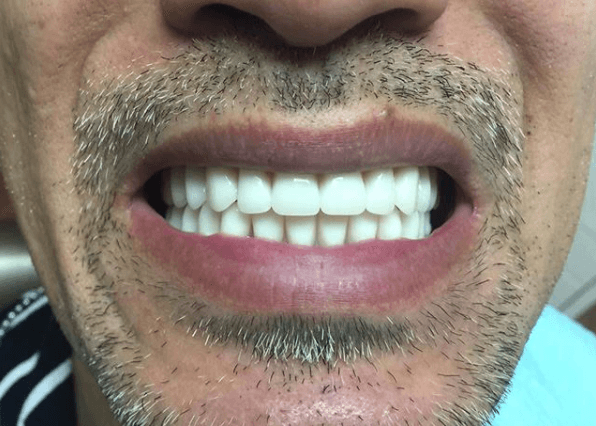If a root canal dentist told you that you need root canal treatment, you might wonder how long your recovery will take. You may also have other questions for us at Dental and Facial Aesthetics of South Florida, such as whether or not you can eat after the procedure, what you can eat, and if you’ll have any other restrictions or requirements while you heal.
We hope that this information will help you feel at ease and prepare for your upcoming root canal treatment.
Is a Root Canal Painful?
One of the most frequent questions we receive from patients is, “Is a root canal painful?” Just a few decades ago, root canal procedures were more involved than they are now. Today’s dental technology makes the process less invasive and shorter in duration.
For most people, getting a root canal will feel like receiving a filling for a cavity. Your root canal dentist will use local anesthesia to numb the area of your mouth just before the procedure starts. The space will stay numb during the procedure and for a little while after it. For most people, there’s more pain before a root canal treatment than during or after it.

What You’ll Feel During the Root Canal Procedure
The procedure starts with an application of numbing medicine. It starts to work within a few seconds, and the area around your tooth and gums will be numb within a couple of minutes.
During the procedure, you’ll feel a little pressure when the root canal dentist reaches the infected pulp and cleans the interior of your tooth. When the temporary filling gets applied, your dentist will ask you to bite in order to make sure you can comfortably open and close your mouth. Your tooth and gums will be numb for about two to four hours after the procedure.
How Root Canal Treatments Work
Most root canal treatments take just one visit, but some require two visits. If you need a second visit, the procedure will be similar to the first. You’ll receive the numbing medication again. The goal of the treatment is to save your natural tooth. This is important because it allows you to keep your beautiful smile, eat the foods you enjoy and avoid ongoing pain in the tooth.
After the infected pulp gets removed from your tooth, you’ll get a temporary crown. Our root canal dentist will make impressions of your mouth and send them to a dental lab. The dental lab will create a customized permanent crown that will get placed over your natural tooth during your next visit.
Initial Root Canal Recovery Time
Your tooth will be numb for up to four hours after a root canal. You’ll be able to return to work or school on the same day after your root canal treatment. Once the numbness wears off, you may be able to use an anti-inflammatory pain reliever, such as acetaminophen or ibuprofen. Naproxen sodium is another type of over-the-counter pain reliever that may reduce any discomfort you have during the first 24 to 48 hours after your root canal.
Days One to Three After Your Root Canal
You may experience some sensitivity in the tooth that had root canal therapy. It’s still important to gently brush and floss around the tooth. Continue to use any dental care and oral hygiene products recommended by your dentist. These products and a thorough oral hygiene routine will help protect the tooth that had the procedure, and it will help keep your other teeth and gums healthy.
Can You Eat After a Root Canal?
After your procedure is over, you might wonder if you can eat after a root canal. Most dentists and endodontists recommend waiting to eat or drink until the numbness has worn off. This reduces your risk of accidentally damaging the temporary crown or the soft tissues in your mouth. The numbness can also interfere with your ability to detect the temperature of your food. If you eat hot food while your mouth is still numb, you could burn your cheeks or tongue.
Once the numbness wears off, avoid chewing on the tooth that had root canal therapy. Temporary crowns aren’t that strong, and chewing may cause them to slide, break or come off the tooth. If the temporary crown comes off your tooth, you’ll need to return to the dentist to have it reattached or replaced.
What Can You Eat After a Root Canal?

In the first few days of root canal recovery, stick with a diet of soft foods. These should be foods that require minimal to no chewing. Some good options for cold soft foods to eat after a root canal include applesauce, yogurt, smooth nut butter, pudding, sorbet, bananas, and flan. For warm, soft foods, try scrambled eggs, mashed potatoes, cooked vegetables, hummus, rice, soup, soft bread, soft cheese, or pasta.
After a few days, once any discomfort and sensitivity have resolved, you may be able to add different foods to your diet. Some good options include soft sandwiches, baked chicken, pancakes, and cooked beans.
Foods to Avoid After a Root Canal
During your root canal recovery time, it’s essential to avoid any foods that could damage your weakened tooth or the temporary crown covering it. Steer clear of sticky foods, such as caramel and taffy. They could pull the temporary crown off your tooth. Avoid hard foods. This includes crusty bread, nuts, seeds, and popcorn.
Don’t chew ice after a root canal. It could crack the temporary crown and your weakened tooth. Avoid foods and beverages that are extremely hot or cold. This includes steaming-hot soup, coffee, or tea.
Ice cream and ice water may trigger any lingering sensitivity in the tooth. Very hot or cold foods or drinks could also loosen the root canal dentist’s adhesive to attach the temporary crown to your tooth.
What Can You Eat After the Root Canal Is Finished?
Once you’ve received the permanent crown on the tooth that had root canal treatment, your root canal recovery time will come to a close. On the day your permanent crown gets placed, be gentle with the tooth. It may be a little sore from having the permanent crown cemented onto it. Depending on which adhesive your dentist uses to affix the permanent crown to your tooth, you may need to avoid eating hard, hot, or ice-cold food for the rest of the day. The next day, you should be able to return to eating all of the foods you enjoy.
Now we’d like to hear from you. Did this information help you prepare for your upcoming root canal? Root canal treatments allow you to maintain a beautiful smile. The recovery time is short, and our dentist ensures that any discomfort will get kept to a minimum. To learn more about root canal treatments and recovery time or schedule an appointment, call us at Dental and Facial Aesthetics of South Florida today.







